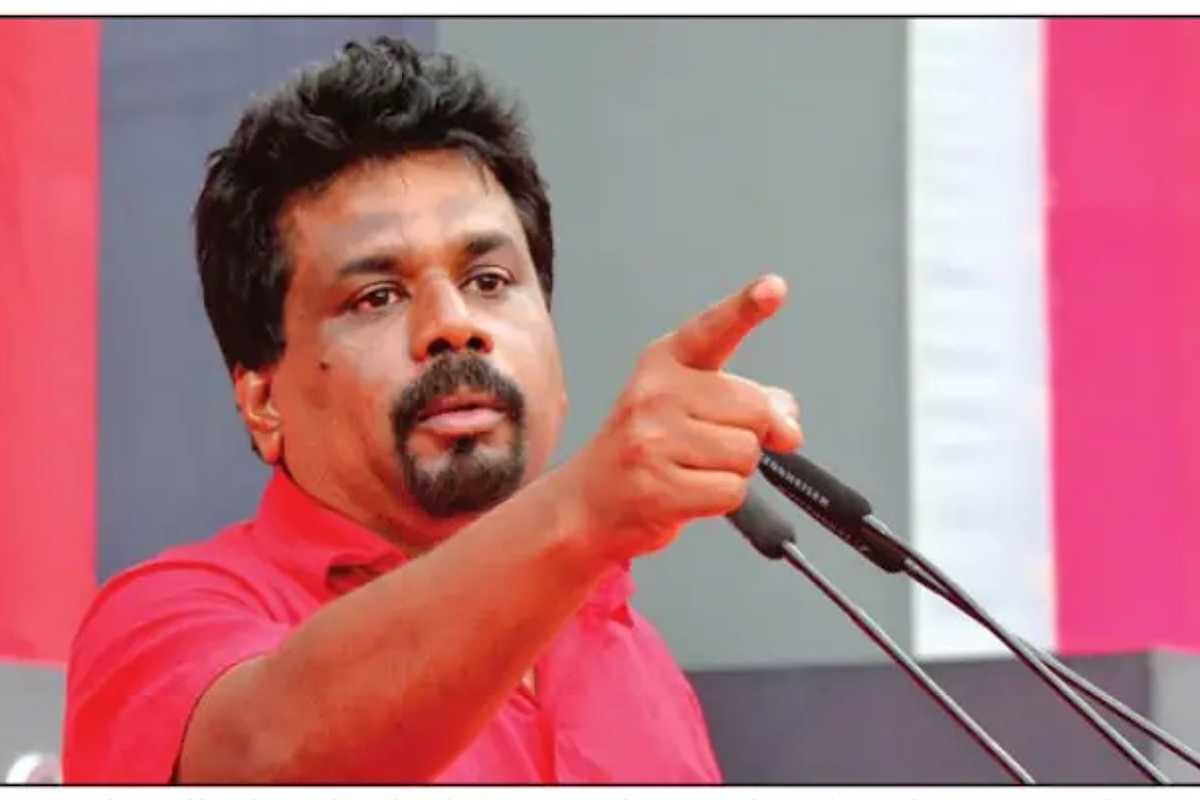Lanka’s Challenge
Sri Lanka’s Presidential election marks a pivotal moment as Anura Kumara Dissanayake, a Marxistleaning leader, gets set to assume the presidency after a victory that reflects the public's growing demand for systemic change.
In a seismic shift that could reshape South Asia’s geopolitical landscape, the resurgence of Sri Lanka’s Janatha Vimukthi Peramuna (JVP) signals more than just a political realignment it marks the rise of a China-aligned force at India’s doorstep, threatening to push New Delhi further into a strategic corner.

(Photo:SNS)
In a seismic shift that could reshape South Asia’s geopolitical landscape, the resurgence of Sri Lanka’s Janatha Vimukthi Peramuna (JVP) signals more than just a political realignment it marks the rise of a China-aligned force at India’s doorstep, threatening to push New Delhi further into a strategic corner. The recent rise of the JVP in Sri Lankan politics has set off alarm bells across India’s strategic and diplomatic circles. Once infamous for its guerrilla tactics and far-left insurgencies, the JVP and its leadership, spearheaded by Anura Kumara Dissanayake (AKD), have resurfaced as a dominant political force.
But behind the populist rhetoric lies a complex history and a set of alliances that could tilt the region’s balance in China’s favour, undermining India’s security and geopolitical influence. The JVP’s roots are steeped in violent history, particularly its links to Sinhala nationalism and ethnic chauvinism. Under the leadership of its founder, Rohana Wijeweera, the JVP led uprisings that terrorized Sri Lanka in the 1970s and 1980s. Though initially founded as a Marxist-Leninist movement, it quickly morphed into a Sinhala nationalist party that stood in stark opposition to the Tamil cause.
In the 1980s, the JVP played a significant role in fostering anti-Tamil sentiment, eventually aligning with the Sri Lankan government during the brutal civil war that led to the massacre of thousands of Tamils. Wijeweera’s leadership saw the party transform from an idealistic revolutionary force into a paramilitary organization that, alongside the Sinhalese nationalist forces, carried out gruesome acts of violence, targeting Tamil civilians in their homes, schools, and neighborhoods. In 1989, Wijeweera was executed by the government, but the party’s legacy of Tamil oppression lives on. Today, the resurgence of the JVP, with Dissanayake at the helm, is not a mere political victory; it signals a return to the chauvinist ethos that once threatened Sri Lanka’s unity.
Advertisement
The most concerning aspect of JVP’s rise is its potential alignment with China’s geopolitical ambitions. Sri Lanka has long been part of China’s ‘String of Pearls’ strategy — a series of Chinese-backed infrastructure projects and political partnerships aimed at encircling India and securing its maritime dominance in the Indian Ocean. China has steadily built its influence in Sri Lanka, investing in key infrastructure projects like the Hambantota Port and Colombo Port City, which critics argue have pushed the country into a debt trap.
A JVP-led government, with its history of anti-India sentiment and dependence on external powers, could serve as a willing proxy for Chinese interests in the region. This becomes even more problematic when we consider China’s role in backing regimes and movements that are antithetical to Indian interests. Sri Lanka’s strategic location makes it a key player in the Indian Ocean, and a JVP-led government could facilitate China’s military and economic influence in ways that would directly undermine India’s security in the region. For India, the victory of the JVP under AKD’s leadership is not just a political setback but a humanitarian and cultural concern as well. India has long had an emotional and historical connection to Sri Lanka’s Tamil population, a group that suffered greatly during the civil war.
The JVP’s history of being against Tamil rights, and its collusion with Sinhalese extremists during the war, raises deep concerns about the future of ethnic harmony in Sri Lanka. As Tamil Nadu watches developments across the Palk Strait with increasing anxiety, any rollback on Tamil rights and a return to ethnic chauvinism will not sit well with Indian policymakers. Such a scenario could inflame tensions between India and Sri Lanka, especially in the southern states, and could further destabilize the region. India’s position in the region has already been weakened by China’s growing influence in neighbouring countries like the Maldives, Nepal, Pakistan and Bangladesh.
Sri Lanka has been a critical outpost for India in its attempts to counterbalance Chinese power in the Indian Ocean. The JVP’s victory, and its potential pivot towards China, would severely undermine these efforts, leaving Bhutan as one of the few remaining nations in South Asia where India still holds a strategic advantage over China. For India, the stakes are high. The JVP’s return to power could further erode India’s influence in its own neighbourhood, pushing the region deeper into China’s sphere of control. If the current political trends in Sri Lanka continue, India may find itself encircled by a growing bloc of Chinese-aligned nations. The rise of the JVP may bring hope to some within Sri Lanka, particularly those disillusioned with the ruling elite.
However, the party’s history, its ethnic chauvinism, and its potential alignment with China make its victory a serious concern for India. For China, a JVP-led Sri Lanka would be yet another gem in its ‘String of Pearls,’ tightening its grip on the region. For India, it would be yet another geopolitical setback in its backyard, with long-term consequences for regional security and stability. India must remain vigilant and reassess its strategies in the region to counterbalance this growing Chinese influence, even as it watches closely to see what form of governance and international alignment the JVP will bring to Sri Lanka. As the JVP tightens its grip on power, Sri Lanka risks falling firmly into the clutches of the Chinese dragon.
(The writer is Associate Professor, Centre For South Asian Studies, Pondicherry Central University.)
Advertisement